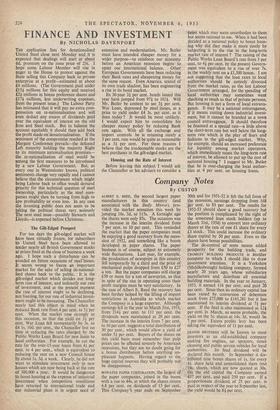Company Notes
By CUSTOS ALBERT E. REED, the second largest paper manufacturers in this country (and associated with the Daily Mirror), pro- vided the market sensation this week by jumping 16s. 3d. to 115s. A fortnight ago the shares were only 85s. The occasion was the increase in the interim dividend from 7 per cent. to 10 per cent. This reminded the market• that the paper companies must be enjoying a good recovery from the reces- sion of 1952, and something like a boom developed in paper shares. The paper business is of course, subject to extremely wide fluctuations. Last year, for example, the production of newsprint in this country fell temporarily by a third and the price of mechanical pulps dropped from £50 to £27 a ton. But the paper companies still charge £50 or more for a ton of newsprint, so that in spite of the rise in operating costs 'their profit margins must be very satisfactory. In - the case of Albert E. Reed the recovery has been further helped by the lifting of import restrictions in Australia to which market the Company is a large exporter. Although earnings fell in the year to March 31st, 1953, from 2141 per cent. to 111 per cent, the dividends were maintained at 20 per cent. The increase in the interim from 7 per cent. to 10 per cent. suggests a total distribution of 30 per cent., which would allow a yield of under 5/ per cent. Buyers of the shares on this yield basis must remember that pulp prices can be affected severely by American recessions, but they are no doubt going for a bonus distribution before anything un- pleasant happens. Having regard to the huge capital reserves they will probably not be disappointed.
BOWATER PAPER CORPORATION, the largest of the paper companies, joined in the boom with a rise to 44s. at which the shares return 6.8 per cent. on dividends of 15 per cent. This Company''; year ends on September 30th and for 1951-52 it felt the full force of the recession, earnings dropping from 168 Per cent. to 83 per cent. The results for 1952-53 should show a good recovery but the position is complicated by the right of the unsecured loan stock holders (up to March 31st, 1954) to convert into ordinary shares at the rate of one £1 share for every £3 stock.. This could increase the ordinary share capital by 50 per cent. Even so the shares have bonus possibilities.
The de-control of rents means added prosperity for the building trade, and CROSSLEY BUILDING PRODUCTS is another company to which I should like to draw investment attention. It is a Yorkshire (Middlesbrough) holding company, formed nearly 20 years ago, whose subsidiaries manufacture and distribute all essential building materials. In the year to January, 1953, it earned 116 per cent. and paid 20 per cent. Since then its ordinary capital has been raised by conversion of debenture stock from £75,000 to £143,281 but it has maintained its interim dividend at 71 per cent. If the final is also maintained at 121 per cent. in March, as seems probable, the yield on the 5s. shares at 14s. 3d. would be 7 per cent. Excess profits levy has been taking the equivalent of 11 per cent.
DENNIS BROTHERS will be known to most investors as an old-established company making fire engines, tar sprayers, street cleaning and public service vehicles for local authorities. Its final dividend will be declared this month. In September it dis- tributed nine bonus shares of is. for every ls. share held and consolidated them into 10s. shares, which are now quoted at 30s. On the old capital the Company earned 437 per cent. and paid 250 per cent. If a proportionate dividend of 25 per cent, is paid in respect of the year to September last, the yield would be 81, per cent,


































 Previous page
Previous page